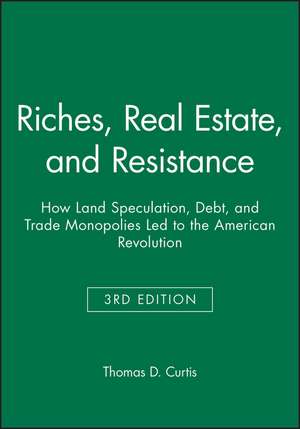Riches, Real Estate, and Resistance – How Land Speculation, Debt, and Trade Monopolies Led to the American Revolution: AJES - Studies in Economic Reform and Social Justice
Autor TD Curtisen Limba Engleză Paperback – 26 aug 2014
Din seria AJES - Studies in Economic Reform and Social Justice
- 23%
 Preț: 700.92 lei
Preț: 700.92 lei -
 Preț: 310.30 lei
Preț: 310.30 lei -
 Preț: 440.51 lei
Preț: 440.51 lei -
 Preț: 473.41 lei
Preț: 473.41 lei -
 Preț: 478.03 lei
Preț: 478.03 lei - 23%
 Preț: 635.25 lei
Preț: 635.25 lei - 30%
 Preț: 554.34 lei
Preț: 554.34 lei - 31%
 Preț: 473.28 lei
Preț: 473.28 lei - 31%
 Preț: 456.96 lei
Preț: 456.96 lei - 28%
 Preț: 257.89 lei
Preț: 257.89 lei - 29%
 Preț: 204.37 lei
Preț: 204.37 lei - 31%
 Preț: 533.52 lei
Preț: 533.52 lei - 32%
 Preț: 489.74 lei
Preț: 489.74 lei - 28%
 Preț: 256.01 lei
Preț: 256.01 lei - 28%
 Preț: 225.81 lei
Preț: 225.81 lei - 30%
 Preț: 502.40 lei
Preț: 502.40 lei - 23%
 Preț: 236.10 lei
Preț: 236.10 lei - 32%
 Preț: 546.35 lei
Preț: 546.35 lei - 32%
 Preț: 470.77 lei
Preț: 470.77 lei - 26%
 Preț: 240.09 lei
Preț: 240.09 lei - 33%
 Preț: 519.09 lei
Preț: 519.09 lei - 30%
 Preț: 223.95 lei
Preț: 223.95 lei - 28%
 Preț: 226.74 lei
Preț: 226.74 lei - 32%
 Preț: 504.44 lei
Preț: 504.44 lei - 32%
 Preț: 532.67 lei
Preț: 532.67 lei
Preț: 215.29 lei
Preț vechi: 305.74 lei
-30% Nou
Puncte Express: 323
Preț estimativ în valută:
41.19€ • 43.01$ • 34.02£
41.19€ • 43.01$ • 34.02£
Carte indisponibilă temporar
Doresc să fiu notificat când acest titlu va fi disponibil:
Se trimite...
Preluare comenzi: 021 569.72.76
Specificații
ISBN-13: 9781118973936
ISBN-10: 1118973933
Pagini: 188
Dimensiuni: 204 x 231 x 7 mm
Greutate: 0.2 kg
Ediția:0003
Editura: Wiley
Seria AJES - Studies in Economic Reform and Social Justice
Locul publicării:Hoboken, United States
ISBN-10: 1118973933
Pagini: 188
Dimensiuni: 204 x 231 x 7 mm
Greutate: 0.2 kg
Ediția:0003
Editura: Wiley
Seria AJES - Studies in Economic Reform and Social Justice
Locul publicării:Hoboken, United States
Notă biografică
Descriere
Was the American Revolution fought to achieve abstract ideals ofindividual freedom or to serve economic interests? "Both!" is the answer provided by Prof. Thomas D.Curtis in this intriguing study. He shows how British policy, particularly as it related to the speculation in lands on thewestern frontier (in the Appalachias and the Ohio Valley), had theunintended effect of uniting diverse interests into a force forrebellion. The leaders included heavily indebted southernlandowners (including George Washington), northern urban landspeculators (including Benjamin Franklin), and wealthy northernmerchants who feared, after 1773, that England would impose trademonopolies that would bankrupt them. Artisans, shopkeepers, and small-scale farmers were influenced by combinations of economicand ideological motives. Small-scale land-oriented interestsconsisted of the settlers who wanted cheap land for farming in thewestern frontier areas, but who were denied legal title to theIndian lands by British law.
